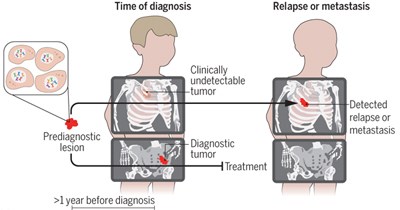Children's bone cancers could remain hidden for years before diagnosis
Summary:
Researchers at SickKids and Wellcome Sanger Institute UK discovered large-scale genetic rearrangements in Ewing Sarcomas and other children’s cancers, which can take years to form in bone or soft tissue. This study will help unravel the causes of childhood cancers and raises the possibility of finding ways to diagnose and treat these cancers earlier.
TORONTO - Scientists have discovered that some childhood bone cancers start growing years before they are currently diagnosed. Researchers at The Hospital for Sick Children (SickKids) and Wellcome Sanger Institute UK discovered large-scale genetic rearrangements in Ewing Sarcomas and other children’s cancers, and showed these can take years to form in bone or soft tissue. This study will help unravel the causes of childhood cancers and raises the possibility of finding ways to diagnose and treat these cancers earlier in the future.
Reported in the journal Science today, the research also showed that cancers with the complex genetic rearrangements were more aggressive and could benefit from more intense treatment than other cancers. This will help doctors decide on the best treatment for each patient.
Ewing sarcoma is a rare cancer found mainly in bone or soft tissue of young teenagers as they grow, and is the second most commonly diagnosed bone cancer in children and young people. Treatment involves chemotherapy, surgery to remove the affected part of the bone if possible and radiotherapy. However, this harsh regime has hardly changed for the last 40 years and fails about one third of patients.
Cancer is a genetic disease and in Ewing sarcoma, two specific genes, EWSR1 and ETS, are fused together. To understand the genetic events leading to this, researchers sequenced and analyzed the genomes of 124 tumours. They discovered that in nearly half of the cases, the main gene fusion occurred when the DNA completely rearranged itself forming complex loops of DNA.
"Many childhood sarcomas are driven by gene fusions, however until now we have not known how or when these key events occur, or whether these processes change at relapse. We found dramatic early restructuring of the genome in 42 per cent of Ewing sarcomas, not only fusing two critical genes together, but also disrupting a number of important areas,” says Dr. Adam Shlien, Scientist Genetics and Genome Biology, Associate Director of Translational Genetics, and co-Director of the SickKids Cancer Sequencing (KiCS) program at SickKids. Shlien is also an Assistant Professor of Laboratory Medicine and Pathobiology at the University of Toronto.
The earlier a cancer is diagnosed, the easier it is to treat, but until now it was thought that Ewing sarcoma was very fast growing. Surprisingly, the researchers found that the complex DNA rearrangements that cause Ewing sarcoma had occurred years before the tumour was diagnosed. This offers possibilities of finding ways to screen for these cancers to treat them earlier.

“In principle this study provides evidence that Ewing sarcoma could be detectable earlier, possibly even before it reveals itself as disease. If we could detect these childhood cancers sooner, when tumours are smaller, they would be much easier to treat. Further research is needed, but this possibility of finding a way to diagnose Ewing sarcomas earlier could help patients in the future,” says Dr. Sam Behjati one of the lead authors on the paper from Wellcome Sanger Institute and University of Cambridge Department of Pediatrics.
“As an increasing and diverse number of tumour genome sequences become available, we may be able to define further rearrangement processes that underlie fusion genes and thus unravel the causes of fusion-driven human cancers. Our goal is to better understand these cancers in an attempt to improve treatment and outcomes,” says Dr. David Malkin, Staff Oncologist, Sr. Scientist Genetics and Genome Biology and co-Director of the SickKids Cancer Sequencing (KiCS) program. Malkin is also a Professor of Paediatrics at the University of Toronto.
This research project was conducted with support from C17 and partially funded by Ewings Cancer Foundation of Canada and Childhood Cancer Canada Foundation, as well as the SickKids Foundation, Wellcome and the St. Baldrick’s Foundation.
About The Hospital for Sick Children
The Hospital for Sick Children (SickKids) is recognized as one of the world’s foremost paediatric health-care institutions and is Canada’s leading centre dedicated to advancing children’s health through the integration of patient care, research and education. Founded in 1875 and affiliated with the University of Toronto, SickKids is one of Canada’s most research-intensive hospitals and has generated discoveries that have helped children globally. Its mission is to provide the best in complex and specialized family-centred care; pioneer scientific and clinical advancements; share expertise; foster an academic environment that nurtures health-care professionals; and champion an accessible, comprehensive and sustainable child health system. SickKids is a founding member of Kids Health Alliance, a network of partners working to create a high quality, consistent and coordinated approach to paediatric health care that is centred around children, youth and their families. SickKids is proud of its vision for Healthier Children. A Better World. For more information, please visit www.sickkids.ca.
About Wellcome Sanger Institute
The Wellcome Sanger Institute is one of the world's leading genome centres. Through its ability to conduct research at scale, it is able to engage in bold and long-term exploratory projects that are designed to influence and empower medical science globally. Institute research findings, generated through its own research programmes and through its leading role in international consortia, are being used to develop new diagnostics and treatments for human disease. To celebrate its 25th year in 2018, the Institute is sequencing 25 new genomes of species in the UK. Find out more at www.sanger.ac.uk or follow @sangerinstitute.
Media Contacts
Lisa Nightingale
The Hospital for Sick Children (SickKids)
416-813-7654 ext. 202049
lisa.nightingale@sickkids.ca
Jessamine Luck
The Hospital for Sick Children (SickKids)
416-813-7654 ext. 201436
jessamine.luck@sickkids.ca

